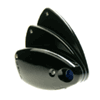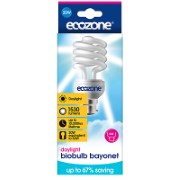If you carry out all of these small steps you will make a difference not only to your own lives but also for the planet – and you will save money too!
-
 We have put together a special kit that includes several of the ideas suggested below: a shower aerator, save-a-flush for the cistern, shower timer and tap aerator. This can save 60 litres a day which equates to saving up to £200 a year if you have a water meter. And still a decent saving on energy costs even if you don't.
We have put together a special kit that includes several of the ideas suggested below: a shower aerator, save-a-flush for the cistern, shower timer and tap aerator. This can save 60 litres a day which equates to saving up to £200 a year if you have a water meter. And still a decent saving on energy costs even if you don't.
- Reduce the water used to flush toilets by fitting a water saving device such as a hippo or save-a-flush or fitting a dual flush toilet. When replacing our toilets, we should look out for low flush or dual flush models.
- Replace your high-volume shower head with an aerated shower head, which uses a mix of water and air to produce a flow that feels strong but can save up to 60% of water compared to an average shower – reducing both your water and energy use. See also our water saving kit, which includes a device to convert your existing showerhead to an aerated showerhead together with several other water saving goodies.
-
 Wait until you have a full load before switching on dishwashers and washing machines.
Wait until you have a full load before switching on dishwashers and washing machines.
- Use the minimum amount of water required when boiling water in saucepans and kettles; that way you’ll save energy as well as water. Or use an eco kettle.
- Turn off that light switch, television on standby or that sneaky game console or phone charger, or printer.
- Lag water pipes and external taps to prevent bursts in cold weather.
- Keep your radiators hot with an automatic radiator bleeding valve and ensure you maximise the heat from your radiators with a radiator booster. All of these tips will help you save energy.
 Invest in a water butt. Your roof collects about 85,000 litres of rain each year which then just runs straight into the sewers. This could fill 450 water butts with free water. You could water your garden, your houseplants, or wash your car for free!
Invest in a water butt. Your roof collects about 85,000 litres of rain each year which then just runs straight into the sewers. This could fill 450 water butts with free water. You could water your garden, your houseplants, or wash your car for free!- If you have a larger home, or an office building, then a rainwater harvesting system may be appropriate. They store much more than a single water butt and the filtered water that is captured can be used in the home - for example to flush toilets - as well as in the garden.
-
 Use a solar-powered charger for your mobile or iPod.
Use a solar-powered charger for your mobile or iPod.
- White goods – check out the A rated appliances that are more eco-friendly.
- Turn off the tap while brushing your teeth, shaving, washing your hands or washing the dishes. This can save up to 6 litres of water per minute.
- Fix dripping taps. A dripping tap can waste up to 15 litres of water a day, or almost 5,500 litres per year. Replace worn washers for a quick and cheap way of saving water.
- Consider using tap aerators to reduce the flow of water while maintaining a good strong stream.
- Shower timers – monitor the amount of time you spend in a shower and challenge yourself to reduce that time. One extra minute in the shower uses around 9 litres of water and in addition to saving water you would also reduce energy usage and reduce your carbon footprint.
-
 Make your gas hob burn more efficiently with a gas energy saver.
Make your gas hob burn more efficiently with a gas energy saver.
- Turn your old newspapers into fuel for a fire or wood burning stove with a briquette maker.
- Wash vegetables and fruit in a bowl rather than under a running tap. The water collected might even be used for watering pot plants.
- Wash your car using a bucket and sponge, then rinse with a watering can. Just 30 minutes with a hosepipe will use more water than the average family uses in a day.
- Pop up buckets – save that water that would have just run away and use it to water your plants. When you first turn on a tap for drinking water, capture the first few litres while you wait for the water to run cold.
- Drought resistant plants in the garden reduce the need for regular watering.
- Turning down your central heating thermostat by one degree can save 10% off your heating bill.

- Eco-friendly bulbs use 25watts of energy but put out a daylight equivalent of 100watts.
- Laptops use 70% less energy than a desktop computer.
- Insulation, draft-proofing & double glazing.
- Close curtains in all rooms at night time to retain heat.
- Don’t drive unless absolutely necessary – use this as an opportunity to get fitter by either walking or cycling.
- Recycle as much as you can. Make it a way of life!
- Buy and use recycled material as it has a fraction of the embodied energy of new material.
See also – some interesting facts about water.